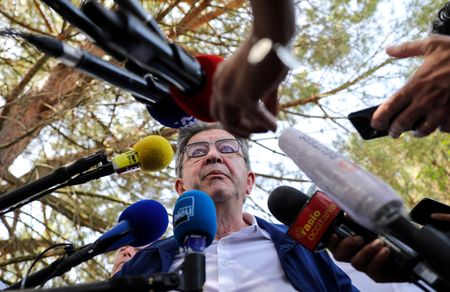


By Michel Rose
TOULOUSE, France (Reuters) – The vibrant southern French city of Toulouse, home to pan-European industrial champion Airbus, might seem an unlikely prize for the anti-free market, eurosceptic Jean-Luc Melenchon.
But after Melenchon came top in the Toulouse constituency hosting the aerospace company in France’s presidential election, it is a seat his new left-wing alliance is targeting as it seeks to deprive President Emmanuel Macron of a parliamentary majority in the votes on Sunday and June 19.
Speaking at a demonstration by healthcare workers in central Toulouse, the candidate for Melenchon’s NUPES alliance – which has united the far left, the Socialists and the Greens for the first time in 20 years – says the city is a bellwether for the whole country and a laboratory for the left.
“All the problems at play in the country are concentrated here,” Hadrien Clouet, a 30-year old academic who has helped draft Melenchon’s national manifesto, told Reuters.
Clouet said the aerospace industry was rebounding from the COVID-19 crisis which saw jet assembly slow dramatically and draw brief warnings that Toulouse could become Europe’s Detroit, ravaged by recession in the auto industry.
But he warned that record-high inflation and the surging cost of living – a theme that cost Macron points in the presidential election – were still hurting.
“The sector is picking up, but salaries are not catching up,” he said, while a loud speaker blared out “there’s revolution in the air”.
Clouet says the left would increase the French government’s stake in Airbus, currently at 11%, and increase employees’ say in the company.
That would be part of a big increase in government control of the economy, with nationalisations of utility EDF and motorways, a ban on job cuts for companies that pay dividends, cutting the pension age to 60 and raising the minimum wage by 200 euros a month.
After his strong showing in April’s presidential election, Melenchon, a hard-left populist, has sought to carry that momentum over to the parliamentary elections, forging the alliance deal and urging the French to “elect (him) prime minister”.
French presidents must pick a prime minister who can control a majority in the lower house of parliament.
Polls show the left-wing alliance has gathered momentum, casting Macron as a free-marketeer who represents the rich while hard-pressed workers and their families suffer, and may deny the president an absolute majority in parliament.
That would force Macron’s “Ensemble” grouping to deal-make with other factions and hamper his ability to drive through his reform agenda. There are only a few polls covering individual constituencies in the 577 seat parliament – but Sunday’s first round will start to show how voters are leaning.
TWO-SPEED CITY
In Toulouse, the showcase of France’s engineering prowess in the aviation sector since at least World War One, fears of the “Detroit effect” during the pandemic have not materialised, and the aerospace industry is firing on all cylinders again.
But as elsewhere, it has created a two-speed city, riven by inequalities between the people in well-paid aerospace jobs and those struggling to make ends meet.
“In these big cities, housing prices are high and are making property unaffordable for the young and working classes,” said Jerome Fourquet, an expert in electoral geography at pollster Ifop said.
“These factors have fuelled a powerful dynamic in favour of that movement in big cities, where Melenchon has cannibalised almost all local left-wing voters.”
Toulouse was one of the epicentres of the “yellow vests” movement in 2018, in which protesters wore hi-vis jackets, which erupted after a rise in petrol prices. Now, with the war in Ukraine, prices are back above the 2 euros per litre psychological threshold and many are feeling the squeeze.
Demonstrating as part of the healthcare protest, Florence Druol, a 37-year-old nurse who drives around the city to take care of her patients, says that is why she will vote for Melenchon’s candidate.
“Macron has taken us for a ride. We need the left to help workers like us who can’t make ends meet,” she said, sporting her yellow vest with the words “we’re still here” written on it.
A tram ride away from the red-brick facades of the city centre, in the suburb of Blagnac, dubbed “Airbus ville” by the locals, workers are driving Teslas and Melenchon is drawing hostility, however – even though he won the wider Toulouse 1 constituency in which the suburb sits in the presidential vote.
“What motivates me in this election is to vote against Melenchon,” Martine Lepage, 57, who works as a tobacconist on the Avenue d’Andromede, in the middle of a modern neighbourhood near Airbus’s HQ built for its army of engineers.
“The left would hurt Airbus workers, but not only. These are companies that need support today and a spirit of capitalism,” she said, adding a large part of her customers worked there.
Macron’s candidate in the constituency, Pierre Baudis, is concerned some voters are taking Airbus for granted.
He says Melenchon’s plan for Airbus would amount to a nationalisation, which would scare away investors and anger Germany, which owns a balancing 11% stake in the company.
“The far left would hurt Toulouse, the region, France and Europe,” he said. “What would the Germans do if we nationalised Airbus?”
(Reporting by Michel Rose, Additional reporting by Tim Hepher; Editing by Alison Williams)

